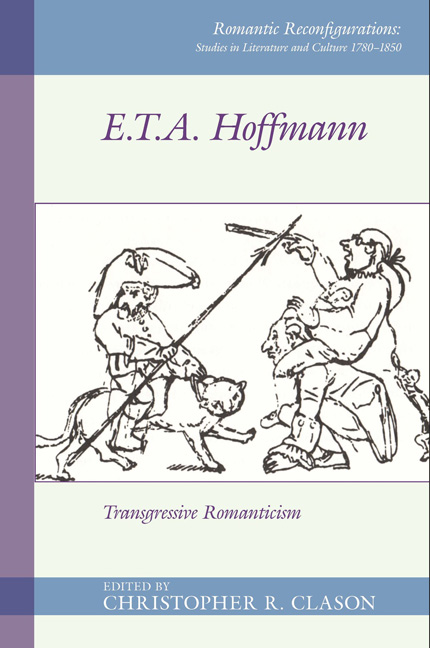Book contents
- Frontmatter
- Contents
- List of Figures
- Acknowledgements
- Notes on Contributors
- Introduction
- I Transgression and Institutions
- 1 “A Poor, Imprisoned Animal.” Persons, Property, and the Unnatural Nature of the Law in E.T.A. Hoffmann's “Das Majorat”
- 2 Vergiftete Gaben: Violating the Laws of Hospitality in E.T.A. Hoffmann's “Das Fräulein von Scuderi”
- 3 Transgressive Science in E.T.A. Hoffmann's Fantastic Tales
- II Transgression and the Arts
- III Transgression in the Märchen
- IV Transgression of Reception in Kater Murr
- Works Cited
- Index
1 - “A Poor, Imprisoned Animal.” Persons, Property, and the Unnatural Nature of the Law in E.T.A. Hoffmann's “Das Majorat”
from I - Transgression and Institutions
- Frontmatter
- Contents
- List of Figures
- Acknowledgements
- Notes on Contributors
- Introduction
- I Transgression and Institutions
- 1 “A Poor, Imprisoned Animal.” Persons, Property, and the Unnatural Nature of the Law in E.T.A. Hoffmann's “Das Majorat”
- 2 Vergiftete Gaben: Violating the Laws of Hospitality in E.T.A. Hoffmann's “Das Fräulein von Scuderi”
- 3 Transgressive Science in E.T.A. Hoffmann's Fantastic Tales
- II Transgression and the Arts
- III Transgression in the Märchen
- IV Transgression of Reception in Kater Murr
- Works Cited
- Index
Summary
Mien, tien.
“Ce chien est a moi,” disaient ces pauvres enfants. “C'est la ma place au soleil.” Voila le commencement et l'image de l'usurpation de toute la terre.
Mine, yours.
“This is my dog,” said those poor children. “That is my place in the sun.” Here is the beginning and the image of the usurpation of the whole earth.
Blaise Pascal, PenséesBarren Splendor
The opening description of R … sitten, the ancestral seat of the von R. family and its Baltic environs in E.T.A. Hoffmann's night piece “Das Majorat” presents a world of clear boundaries and dichotomies, of oppositions in human life and social organization so stark that they appear reflected in the very landscape in which they unfold. Indeed, these human distinctions seemingly spring from the properties of the ground itself, as is only fitting for a story whose eponymous legal instrument is meant to bind future first-born male heirs to inalienable landholdings in order to preserve the splendor familiae et nominis and to ensure that an aristocratic family's economic power and influence, grounded in its property, would not be divided and dispersed over the generations. For readers familiar with the purpose of a Majorat, the irony of the story's opening sentences is immediately apparent, however, for Hoffmann's narrator could not make it any clearer that no splendor whatsoever is connected to the von R.'s utterly bleak family seat. The immediate surroundings of castle R … sitten are “rough and desolate” and “barely a blade of grass grows here and there from the groundless drift sand.” On one side the castle faces the Baltic Sea, on the other, its naked walls are abutted, without the transition of a park or garden and their symbolic mediation of wild nature and human culture, by “a scanty pine-forest, which spurns the colorful ornament of spring in its eternal, gloomy grief, and where, instead of the cheerful jubilations of songbirds awakened to new desire, echo only the eerie croaking of the ravens and the whizzing screeching of storm-proclaiming seagulls.” Such uncanny desolation, in which the cycle of the seasons itself seems interrupted, pertains to the family seat alone, and a mere fifteen minutes away, nature is suddenly altered, when, “as if by a stroke of magic” one is “transported” to an alternative world of “blossoming fields and abundant farmlands and meadows.”
- Type
- Chapter
- Information
- E. T. A. HoffmannTransgressive Romanticism, pp. 19 - 44Publisher: Liverpool University PressPrint publication year: 2018



